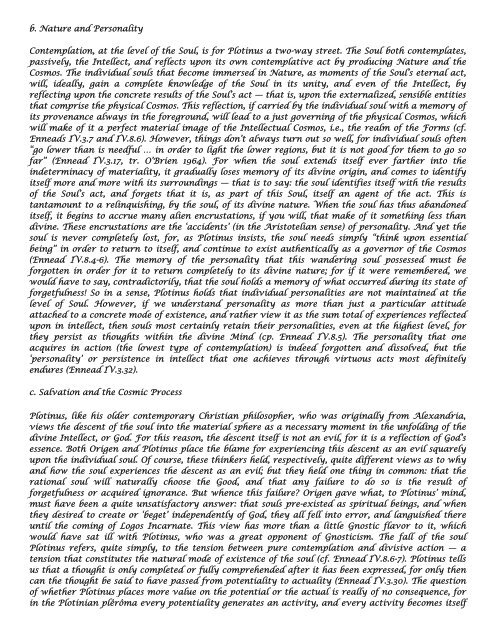Neo-Platonism - Grand Lodge Bet-El
Neo-Platonism - Grand Lodge Bet-El
Neo-Platonism - Grand Lodge Bet-El
Create successful ePaper yourself
Turn your PDF publications into a flip-book with our unique Google optimized e-Paper software.
. Nature and Personality<br />
Contemplation, at the level of the Soul, is for Plotinus a two-way street. The Soul both contemplates,<br />
passively, the Intellect, and reflects upon its own contemplative act by producing Nature and the<br />
Cosmos. The individual souls that become immersed in Nature, as moments of the Soul’s eternal act,<br />
will, ideally, gain a complete knowledge of the Soul in its unity, and even of the Intellect, by<br />
reflecting upon the concrete results of the Soul’s act — that is, upon the externalized, sensible entities<br />
that comprise the physical Cosmos. This reflection, if carried by the individual soul with a memory of<br />
its provenance always in the foreground, will lead to a just governing of the physical Cosmos, which<br />
will make of it a perfect material image of the Intellectual Cosmos, i.e., the realm of the Forms (cf.<br />
Enneads IV.3.7 and IV.8.6). However, things don’t always turn out so well, for individual souls often<br />
“go lower than is needful … in order to light the lower regions, but it is not good for them to go so<br />
far” (Ennead IV.3.17, tr. O’Brien 1964). For when the soul extends itself ever farther into the<br />
indeterminacy of materiality, it gradually loses memory of its divine origin, and comes to identify<br />
itself more and more with its surroundings — that is to say: the soul identifies itself with the results<br />
of the Soul’s act, and forgets that it is, as part of this Soul, itself an agent of the act. This is<br />
tantamount to a relinquishing, by the soul, of its divine nature. When the soul has thus abandoned<br />
itself, it begins to accrue many alien encrustations, if you will, that make of it something less than<br />
divine. These encrustations are the ‘accidents’ (in the Aristotelian sense) of personality. And yet the<br />
soul is never completely lost, for, as Plotinus insists, the soul needs simply “think upon essential<br />
being” in order to return to itself, and continue to exist authentically as a governor of the Cosmos<br />
(Ennead IV.8.4-6). The memory of the personality that this wandering soul possessed must be<br />
forgotten in order for it to return completely to its divine nature; for if it were remembered, we<br />
would have to say, contradictorily, that the soul holds a memory of what occurred during its state of<br />
forgetfulness! So in a sense, Plotinus holds that individual personalities are not maintained at the<br />
level of Soul. However, if we understand personality as more than just a particular attitude<br />
attached to a concrete mode of existence, and rather view it as the sum total of experiences reflected<br />
upon in intellect, then souls most certainly retain their personalities, even at the highest level, for<br />
they persist as thoughts within the divine Mind (cp. Ennead IV.8.5). The personality that one<br />
acquires in action (the lowest type of contemplation) is indeed forgotten and dissolved, but the<br />
‘personality’ or persistence in intellect that one achieves through virtuous acts most definitely<br />
endures (Ennead IV.3.32).<br />
c. Salvation and the Cosmic Process<br />
Plotinus, like his older contemporary Christian philosopher, who was originally from Alexandria,<br />
views the descent of the soul into the material sphere as a necessary moment in the unfolding of the<br />
divine Intellect, or God. For this reason, the descent itself is not an evil, for it is a reflection of God’s<br />
essence. Both Origen and Plotinus place the blame for experiencing this descent as an evil squarely<br />
upon the individual soul. Of course, these thinkers held, respectively, quite different views as to why<br />
and how the soul experiences the descent as an evil; but they held one thing in common: that the<br />
rational soul will naturally choose the Good, and that any failure to do so is the result of<br />
forgetfulness or acquired ignorance. But whence this failure? Origen gave what, to Plotinus’ mind,<br />
must have been a quite unsatisfactory answer: that souls pre-existed as spiritual beings, and when<br />
they desired to create or ‘beget’ independently of God, they all fell into error, and languished there<br />
until the coming of Logos Incarnate. This view has more than a little Gnostic flavor to it, which<br />
would have sat ill with Plotinus, who was a great opponent of Gnosticism. The fall of the soul<br />
Plotinus refers, quite simply, to the tension between pure contemplation and divisive action — a<br />
tension that constitutes the natural mode of existence of the soul (cf. Ennead IV.8.6-7). Plotinus tells<br />
us that a thought is only completed or fully comprehended after it has been expressed, for only then<br />
can the thought be said to have passed from potentiality to actuality (Ennead IV.3.30). The question<br />
of whether Plotinus places more value on the potential or the actual is really of no consequence, for<br />
in the Plotinian plêrôma every potentiality generates an activity, and every activity becomes itself
















